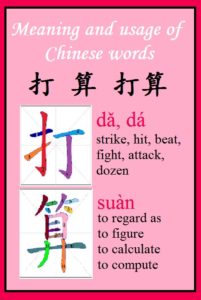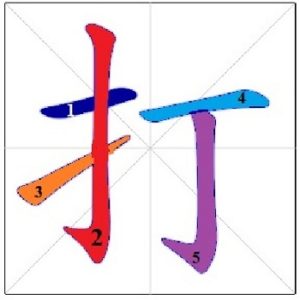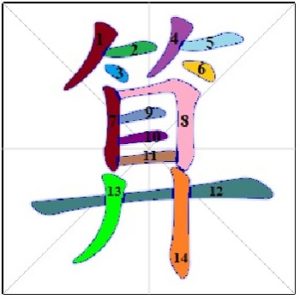Meaning and Components of 打, 算 and 打算
打
Meaning: strike, hit, beat, fight, attack, dozen.
HSK Level : Level 1
Radical : 扌(hand 手)
Component : 丁
Stroke Count: 5
Pinyin: dǎ, dá
Parts of speech: (动) verb, (介) preposition, (量) measure word
算
Meaning: to regard as; to figure; to calculate; to compute
HSK Level : Level 4
Radical : 竹 (bamboo)
Component : 具
Stroke Count: 14
Pinyin: suàn
Parts of speech: (动) verb
Chinese phrase 打算
Meaning: to plan; to intend; to calculate; plan; intention; calculation
HSK Level : Level 3
Pinyin: dǎ suàn
Parts of speech: (动) verb (名) noun
Usage
Chinese word 打
(动) verb
打电话 (打電話)Dǎ diàn huà - to make call
打字 dǎ zì - to type
打架 dǎ jià - to fight
打针(打針)dǎ zhēn - to inject
(介) preposition
1. Indicates the starting point of location, time, and scope
打明儿开始 (打明兒開始)Dǎ míng er kāi shǐ - starting from tomorrow
打这儿往西走 Dǎ zhè'er wǎng xī zǒu - go West from here
2. expressing route or place
打水路走,三天可以到 Dǎ shuǐ lù zǒu, sān tiān kě yǐ dào
Take the water route and you will reach there within 3 days.
Above sentences are used only in speech and not in writing. Colloquial expression.
(量) measure word
When using the Chinese word as a measurement word, it means a dozen. The pinyin for this Chinese word will be dá rather than the 3rd tone dǎ. For example,
一打铅笔 Yī dá qiān bǐ A dozen of pencils.
Chinese word 算
(动) verb
算了,别再说(說)了。Suàn le, bié zài shuō le
Forget it, don't talk about it anymore.
我算你今天一定会来。Wǒ suàn nǐ jīntiān yīdìng huì lái
I suppose you will come today
你算是个甚么东西。 Nǐ suàn shì gè shén me dōng xī
Who do you think you are?
什么事都是他说(說)了算。shén me shì dōu shì tā shuō le suàn
He has the final say regarding everything
他也算是我朋友。Tā yě suàn shì wǒ péng yǒu
He is also regarded as my friend.
Chinese phrase 打算
(动) verb
你打算什么(麼)时候(時候)去北京读书(讀書)?
Nǐ dǎ suàn shén me shí hòu qù běi jīng dú shū?
When are you planning to go to Beijing to study?
她打算明年结(結)婚。Tā dǎ suàn míng nián jié hūn.
She is planning to get married next year.
(名)noun
你毕业(畢業)以后(後)有什么(麼)打算?Nǐ bì yè yǐ hòu yǒu shé me dǎ suàn?(colloquial)
What is your plan after you graduate?
为前途做好打算。Wèi qián tú zuò hǎo dǎ suàn.
Make plans for the future.
Collocation of the Chinese phrase 打算
The Chinese phrase 打算 is usually used together with the following Chinese words to form meaningful Chinese phrases and Chinese sentences.
打算动(動)身~ dǎ suàn dòng shēn plan/intent to leave
打算去~ dǎ suàn qù ~ plan / intent to go
为自己打算 wèi zì jǐ dǎsuàn make plans for oneself
为别人打算 wèi bié rén dǎ suàn make plans for others
为前途打算 wèi qián tú dǎ suàn plan for the future
为将(將)来打算 wèi jiāng lái dǎ suàn plan for the future
Mandarin Chinese Key word expansion
In order to improve your Chinese skills, be it writing, listening or speaking, it is important that you know how to expand the Chinese word that you have learned. Today, you will learn how to use the Chinese phrase 打算 to ask questions and to form commonly used conversational sentences. For example,
If you want to know what plans your friends have for the weekend, you can ask
周末有什么(麼)打算?Zhōu mò yǒu shé me dǎ suàn?
Below are some of the word expansion examples of 打算 which you can learn or practice with your friends.
打算和朋友去看演唱会(會) dǎ suàn hé péng yǒu qù kàn yǎn chàng huì
Planning to go to a concert with my friends
打算在家休息 dǎ suàn zài jiā xiū xí
Planning to rest at home
不打算工作 bù dǎ suàn gōng zuò
Not planning to work
今晚你有什么(麼)打算?jīn wǎn nǐ yǒu shé me dǎ suàn?
What are your plans for tonight?

Synonym
Often, people questioned the difference between the Chinese word 打算 and 计划. Are they the same or are they different in terms of usage and meaning. Well, these two Chinese words 打算 and 计划 are actually Synonyms. In my opinion, they are similar in meaning, but at the same time not totally equal. You can use them interchangeably without any problem grammatically. For example,
a. 她打算明年结(結)婚 Tā dǎ suàn míng nián jié hūn
b. 她计划(計劃)明年结((結))婚 tā jì huà míng nián jié hūn
Both sentences, a and b, can be translated in English as she plans to get married next year. However, in terms of nuance, sentence a is merely stating an intention whereas sentence b is something that has been planned out, thought over before making that decision.
In my opinion, the girl in sentence a is merely stating her intention to get married next year, but whether this wedding will actually be carried out is highly questionable. She might change her mind later on. However, the chances of a wedding in sentence b will be much higher because the girl has made plans for it. She would have already chosen the venue for the wedding, the date and also where she will be going for her honeymoon.Moreover, I personally think that 打算 is more colloquial and informal, whereas 计划is more formal and more in the written form.
We have covered many aspects of the Chinese words Da 打,suan 算 and 打算 dasuan. We hope you are now able to use these Chinese words with ease after this lesson. In order to make double sure that you have understood this lesson well, we hope you can provide your sentences using the Chinese words we have covered in this post. You may email your sentences to us via the contact form or in the comment column. We really would love to hear from you.
If you have any questions regarding the Chinese words 打 算 or 打算, do feel free to drop us a line as well. We will try our best to answer any questions you may have.
We have provided extra resources in our resource library page. Do click here and proceed to download the materials prepared for our subscribers only.

